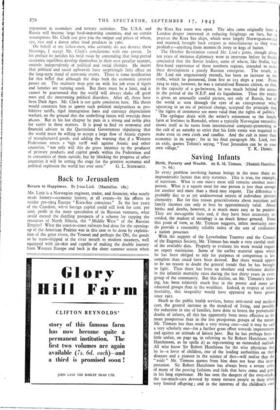Back to Jerusalem
Return to Happiness. By Jonas Lied. (Macmillan. 'Ss.)
MR. LIED is a Norwegian engineer, trader, and financier, who nearly made history—economic history, at all events—by his efforts to render pre-1914 Europe " Kara-Sea conscious." In the last years of the Czardom, wh'n foreign capital could still look for cent. per cent. profit in the more speculative of its Russian ventures, what could exceed the dazzling prospects of a scheme for tapping the resources of North Siberia, the " Middle West " of the Russian Empire? What the coast-to-coast railways had done for the opening- up of the American Prairies was in this case to be done by exploita- tion of the great rivers, the Yenesei and perhaps the Obi, the goods to be trans-shipped at the river mouth to modem steamers, well equipped with ice-skin and capable of making the double journey from Western Europe and back in the short 'summer season when
the Kara Sea route was open. The idea came originally from a London draper interested in reducing freightage on furs, but in practice the Kara Sea ships, which were largely Norwegian-owned and .manned, brought back cargoes as miscellaneous as they were profitab.e—anything -from mammoth ivory to kegs of butter.
The October Revolution ruined Mr. Lied s plans, though about ten years of tortuous diplomacy were to intervene before he finally concluded that the Soviet leaders, some of whom, like Stalin, had first-hand experience of these northern regions, intended to make their development a purely Russian enterprise. The result, as Mr Lied not ungenerously records, has been an increase in the traffic, which he pioneered, from five to 115 ships a year. • From 1914 to 1931, however, he was a naturalised Russian citizen, so that, in the capacity of a go-between, he was much behind the scenes in the period of the N.E.P. and its liquidation. Thus the reader is given an unusually candid picture, not only of Russia, but of the world as seen through the eyes of an entrepreneur who,* operating in an era of political change, accepted the principle that " the rights of commerce are more valid than the rights of politics."
The epilogue deals with the writer's retirement to the family farm at Soelsnes in Romsdal, where a typically Norwegian versatility shows itself as he turns from international company-promoting to the cult of an autarky so strict that his little estate was required to make even its own cloth and candles. And the cult is more than economic in its scope : for in his final paragraph Mr. Lied, now an exile, quotes Tolstoi's saying, " Your Jerusalem can be in your


























 Previous page
Previous page